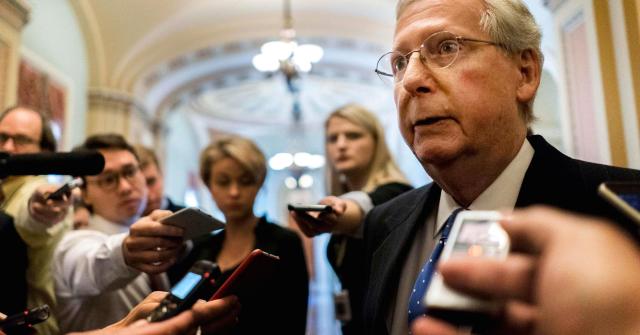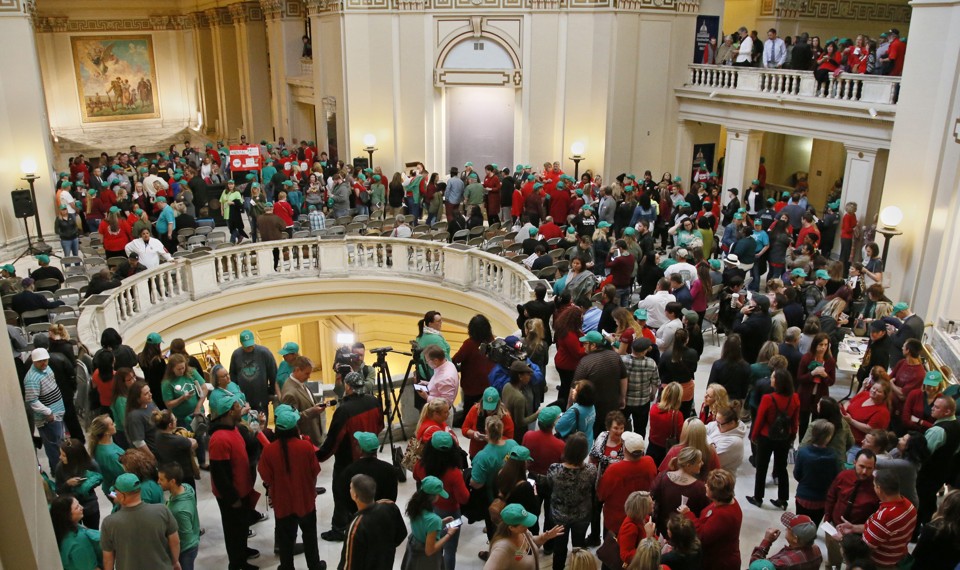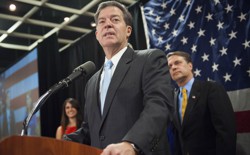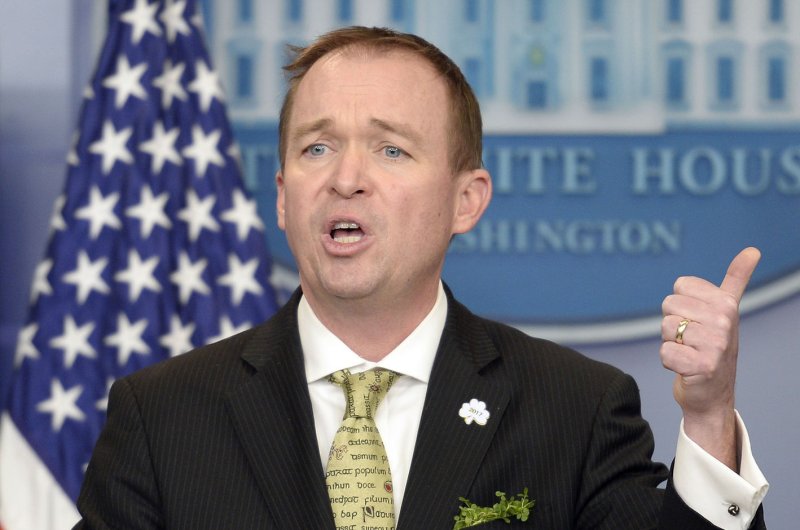Salon
GOP insider Bruce Bartlett: “The Republican Party needs to die”
Onetime Reagan White House aide Bruce Bartlett on the media’s massive failure and his own party’s living death
 Bruce Bartlett (Credit: Getty/Drew Angerer)
Bruce Bartlett (Credit: Getty/Drew Angerer)
Chauncey Devega November 23, 2017
American democracy is in crisis, a fact that should be obvious to everyone but that too many people keep ignoring. The president of the United States, Donald Trump, does not believe in or respect basic norms of democratic governance. His words and behavior reveal a deep affinity for fascism.
Over the last few decades there has been an increase in authoritarian values among American voters, and this is especially true for Republicans and other conservatives.
The Citizens United decision defined corporate money as free speech. This undermines American democracy by allowing the most powerful business interests and the richest individuals to overrule and veto the desires of the American people.
The United States is an oligarchy.
Recent research shows that the country’s elected officials are most responsive to the rich, business interest groups and others with the resources to buy access.
The Republican Party uses gerrymandering and voter suppression to remain in power. It has ceased to believe in any form of compromise or negotiation with Democrats or liberals. This has made consensus politics and a healthy, responsive, functioning government all but impossible.
Public faith in basic social institutions is declining and the American public, broadly speaking, lacks civic literacy. This is a recipe for the American authoritarianism and demagoguery embodied by Trump and the Republican Party.
Journalists, the so-called Fourth Estate, were supposed to sound the alarm about these developments. Instead, the corporate news media has all too often defaulted to a naïve belief that America’s democratic institutions are healthy and strong, thus able to resist any challenge or corruption. Instead of being truth-tellers who balance power by informing the public so the latter can make good decisions, the corporate media empowered Donald Trump and the Republican Party through a slavish devotion to “fairness” and “balance” and a “both sides do it” narrative.
How has the truth been assaulted by Donald Trump and the Republican Party? What role did Trump’s incessant lies and his talking points about “fake news” play in his election? How does the myth of the “liberal media” empower the American right? Is there any space for a liberal or centrist alternative to Fox News and the broader right-wing disinformation-propaganda machine? Can the Republican Party in its present form be saved? Does the Trump campaign’s alleged collusion with Russia during the 2016 presidential election reflect a larger cultural and political problem?
In an effort to answer these questions I recently spoke with Bruce Bartlett. He was a former White House adviser under President Ronald Reagan and also served under President George H.W. Bush. Bartlett is a regular contributor to the New York Times and has appeared on CNN, MSNBC and other major news networks. He is the author of the new book “The Truth Matters: A Citizen’s Guide to Separating Facts From Lies and Stopping Fake News in Its Tracks.”
A longer version of this conversation can be heard on my podcast, which is available on Salon’s Featured Audio page.
How do you think Donald Trump was able to get elected?
I admit that I was dismayed by the election results. As I thought about how it happened, it just seemed to me that a big part of the story is the media. The media is broken and has adopted certain conventions that I think have normalized Trump’s craziness as well as the craziness of the Republican Party.
Why do you think the mainstream news media was so reluctant to directly confront and expose Trump’s lies?
When the mainstream media began to downsize to cope with the loss of revenue from advertising and subscribers, the first thing they did was lay off their most senior reporters. They were able to save a lot of money that way. The problem is that a lot of journalistic training takes place informally in the newsroom, where young reporters learn from the old veterans who have been around for a long time. One of the things that you learn in that way that can’t be taught in the university is how to tell when somebody is lying.
There is also “he said, she said” journalism, where in order to gain access to a source that can now go around the traditional news media through Twitter and other methods you have to give them whatever they want.
Your source has to be convinced that you’re going to be good to them and get their message out the way they want it to be gotten out, so reporters are now almost forced to be stenographers. Now, obviously the reporters can’t just do that, but neither can they inject themselves into the story and say, “OK, here’s what my source inside the campaign is saying but my reporting and examination of the facts says this is all bullshit, that it’s a lie.” They can’t do that because then they burn their source, the source will never talk to them again if they tell the truth.
Instead, they go to the Clinton campaign and say, “What do you think about this statement that was just given to me by somebody in the Trump campaign?” They will say whatever it is they say and the reporter will take that down. “Trump said this, Clinton said that,” and that’s all you get. You don’t get the follow-up, you don’t get the reporting, the analysis, the fact-checking that would tell you which one is right and which one is wrong.
Conservatives have also created a cudgel with the myth of the “liberal news media.” It intimidates the press into being subservient to their agenda in the interest of “fairness” and “balance.”
Yes, but I also think that organizations like the New York Times bend over much too far backwards. I don’t know why they bother. Conservatives don’t read the New York Times; they’re not going to lose any subscribers by telling the truth.
If you were to pick a moment when the media landscape changed in a way that helped to birth Donald Trump’s presidency, what would it be?
I think there are several inflection points. I would go back to 1969 as the beginning, because that was the year that Spiro Agnew gave his famous speech attacking the media. It set the tone for everything conservatives have thought about the media ever since, which is that it is “elitist,” opposed to their values, and hopelessly liberal. It was nonsense then and it’s certainly nonsense now.
As a consequence, conservatives I think have long drifted away from the mainstream media and sought out alternative media. Even before talk radio, it was very common that conservatives would get much of their news from newsletters and small magazines like Human Events. The fact that conservatives had an alternative media network actually put them in a good position once the mainstream media began to decline.
I think liberals, by contrast, have always been very happy with the mainstream media. I think Democrats really depended on the New York Times to come up with good ideas for policies and hearings and so on. Then came the ending of the Fairness Doctrine, which immediately gave rise to Rush Limbaugh and others of his ilk. I think the next inflection point was of course the Republican takeover of Congress [in 1994] and then the creation of Fox News very shortly thereafter.
Why do you think there has not been a successful counter to right-wing talk radio, and right-wing media more generally, from liberals and centrists?
Well I think the simple answer is that liberals and centrists are perfectly content with the mainstream media. They’re very happy with the New York Times and the Washington Post exactly as they are; they’re happy with ABC, CBS, NBC and NPR. People forget that NPR is essentially liberal talk radio, and that’s one reason why a more explicitly liberal type of talk radio couldn’t compete. NPR, like Limbaugh, is very, very good at what it does. I think that’s a big part of the problem.
And of course liberals never had a chip on their shoulder — they never felt that the media was biased against them and they never felt that their ideas were ridiculed the way Republicans and conservatives have always believed. The soil is simply not conducive to something that would be more explicitly liberal.
Back in the 1960s, the political scientist and historian Richard Hofstadter famously wrote about the power that anti-intellectualism and the “paranoid style,” i.e., conspiracy theories, held over American conservatives. Decades later, fringe narratives are now the mainstream in American conservative thought and media. This is extremely dangerous for democracy. How can we find solutions to problems when we can’t agree on the nature of empirical reality?
I think you’ve touched on one of the most disturbing aspects of the Fox News phenomenon, which is that it normalizes and mainstreams a lot of nutty crackpot conspiracy crap that would otherwise stay in the fever swamps of the far right.
I have an idea, and tell me if you think it is viable. The so-called experts and other talking heads who appear on the TV news should have their qualifications, professional relationships (i.e., who is paying them) and political affiliations listed under their names. This would help the public to understand the agenda at work. Do you think that would actually help our public discourse?
Well, I don’t know if it would help, but I do think it is genuinely desirable. There is no reason why that information could not at a minimum be posted online. You reminded me of another moment that changed my thinking about how this all operates. Many years ago when cable news became ubiquitous, I was working for a conservative think tank and I was often invited to be a talking head on various networks.
In the very early years I would usually be on with somebody like myself — for example, a senior fellow at a liberal think tank. The problem from the point of view of producers was there were no fireworks because we respected each other. We understood what the data was, we understood what the literature was, our differences were not that great and we often agreed with each other. Producers hated this.
I noticed after a few years that I was no longer being put on against a peer but instead people that I had no idea who they were. For example they were a “Democratic consultant” or a “liberal activist” — very vague terms. I’d never heard of these people and in fact when I would go online to look them up I couldn’t find anything. It was as if they literally didn’t exist. Another problem was that these people I was up against clearly had gotten media training. All the networks have the same attitude about talking heads, which is that they want somebody who’ll give the rote repetition of the Republican line of the day and someone else who’ll give the rote repetition of the Democratic line of the day. There will be absolutely zero agreement and preferably they’ll yell at each other and scream and we’ll have fireworks, which are good for ratings.
With your many years of experience in Washington, with the news media, and now your new book on “fake news,” how much does the Russia scandal remind you of Watergate? Or do you think what Robert Mueller uncovers about Donald Trump and his associates will be even worse?
I hope not. But I am prepared for it. Trump is clearly the most incompetent president we’ve ever had in our lives. Richard Nixon may well have been the smartest. Nixon was cursed by paranoia, and I think Trump is as well. The question then becomes: Is this incompetence a good thing or a bad thing? Is it more dangerous to have a paranoid incompetent than it was to have a highly intelligent paranoid person as president? I don’t think we can tell. When I hear Trump talk, I sometimes have this feeling that he literally had no idea what was going on in his own campaign. He can deny these allegations and be perfectly truthful in his own mind because nobody told him.
He’s a useful idiot.
That’s one way of describing him. It may be that he is the person who will be the most shocked when the truth finally comes out. He may say, “Oh my God, I had no idea my son-in-law was doing such stupid things.”
To watch the national and global calamity that is Trump’s presidency in real time is unbelievable. If someone had told me 10 years ago that the country would be in such a crisis I would have said they were crazy. Do you feel the same way, or did you see it coming given how extreme the Republican Party has become over the last few decades?
Well, it’s vastly worse than I could possibly have imagined. I had this naïve idea that Trump had been a successful businessman because he had competent staff. I just assumed that Trump’s company had an army of lawyers and vice presidents with MBAs from Harvard Business School who went around like the guy behind the elephant in the parade with a broom and a shovel cleaning up his messes and fixing the contracts and getting the deals done properly that their boss was too incompetent to do himself. I just assumed that once he got into the White House we’d find these people would just come in and run things. I was shocked that that wasn’t the case. There was nobody.
If someone were to ask you why Trump’s voters backed him, how would you answer?
That’s the $64,000 question. Certainly a big part of it was voter fatigue. As far as the Democrats are concerned it has been true since at least the post-World War II era that each party gets eight years — and only eight years. There is only one exception to that rule and it was George H.W. Bush. It was probably in the cards that whoever got the Republican nomination was in a much better position to win than was generally assumed. Of course, Hillary Clinton turned out to be a historically poor candidate not just in a general way but also technically. From what I’ve read about her campaign, Hillary didn’t do statewide polling in the last couple of weeks before the election and really had no idea what was going on in critical battleground states.
The Comey letter [to Congress in late October] was horribly timed of course. I think there’s been this idea in American politics for a very long time that outsiders have some kind of special gift as compared to professional politicians. Moreover, Republicans just love the idea of bringing in a businessman to run the government. What they don’t realize is what you end up with is somebody who has absolutely no training for the job. The most successful presidents in recent memory were men with massive amounts of skill, namely [Lyndon B.] Johnson and Nixon. They had been in government their whole lives.
How did today’s Republican Party, in your estimation, become the way it is? Can it be saved?
The Republican Party needs to die. It’s already a zombie. It’s brain dead.
Chauncey DeVega is a politics staff writer for Salon. His essays can also be found at Chaunceydevega.com. He also hosts a weekly podcast, The Chauncey DeVega Show.
 Chairman Sen. Bob Corker, R-Tenn., confers with Sen. Ron Johnson, R-Wisc., Right, as Sen. Jeff Flake, R-Ariz., Left, reads nearby during Senate Foreign Relations Committee hearing on North Korea on capitol hill in Washington, Tuesday, Nov. 14, 2017. (AP photo/ Pablo Martinez Monsivais)
Chairman Sen. Bob Corker, R-Tenn., confers with Sen. Ron Johnson, R-Wisc., Right, as Sen. Jeff Flake, R-Ariz., Left, reads nearby during Senate Foreign Relations Committee hearing on North Korea on capitol hill in Washington, Tuesday, Nov. 14, 2017. (AP photo/ Pablo Martinez Monsivais)
 Melina Mara | The Washington Post | Getty Images. The CBO report estimates that lower-income groups would foot a bigger bill from tax cuts than previously expected.
Melina Mara | The Washington Post | Getty Images. The CBO report estimates that lower-income groups would foot a bigger bill from tax cuts than previously expected. Ogrocki / AP
Ogrocki / AP
 Federal Consumer Protection Bureau acting director Leandra English filed a lawsuit Sunday to keep her position, after President Donald Trump named budget director Mick Mulvaney, pictured, to the post. File Photo by Olivier Douliery/UPI/Pool
Federal Consumer Protection Bureau acting director Leandra English filed a lawsuit Sunday to keep her position, after President Donald Trump named budget director Mick Mulvaney, pictured, to the post. File Photo by Olivier Douliery/UPI/Pool Mulvaney was seen entering the CFPB’s headquarters in downtown Washington carrying a Dunkin Donuts bag.
Mulvaney was seen entering the CFPB’s headquarters in downtown Washington carrying a Dunkin Donuts bag.
/cdn.vox-cdn.com/uploads/chorus_image/image/57713303/869460734.jpg.0.jpg) Drew Angerer/Getty Images
Drew Angerer/Getty Images/cdn.vox-cdn.com/uploads/chorus_asset/file/9734951/Screen_Shot_2017_11_22_at_9.38.35_AM.png)
/cdn.vox-cdn.com/uploads/chorus_asset/file/9735021/Screen_Shot_2017_11_22_at_9.44.51_AM.png) Penn-Wharton Budget Model
Penn-Wharton Budget Model/cdn.vox-cdn.com/uploads/chorus_asset/file/9735039/Screen_Shot_2017_11_22_at_9.48.53_AM.png) Penn-Wharton Budget Model
Penn-Wharton Budget Model/cdn.vox-cdn.com/uploads/chorus_asset/file/9735051/11_17_17tax2_f2.png)